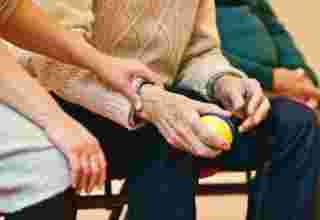
A TV child psychologist has shared his top tips for discussing your child’s mental health during COVID-19.
More than 50 per cent of parents feel that this year’s lockdowns have had a detrimental effect on their children’s mental well-being, according to new research.
More than four in 10 said that since the outbreak of Covid-19, they have seen their children display behaviours that suggest they are experiencing a heightened sense of anxiety.
A third said their children have shown a lack of energy and enthusiasm since March, with one in five saying they are no longer sleeping very well.
Perhaps most worryingly, a quarter said they don’t think they would be able to identify if their child was struggling with mental health.
Almost half (48 per cent) of the 1,000 parents of four-12-year-olds who took part in the research said they felt that Covid-19 had also “negatively impacted” on their children’s friendships.
This was echoed in a parallel study of 500 children aged six-10.
When asked what they missed most through lockdown, more than 60 per cent said their friends, followed by grandparents (45 per cent) and going to school as normal (38 per cent).
The research was commissioned by Tangle Teezer, which is working with TV child psychologist Dr Sam Wass on a campaign to help parents get their children to open up to them during haircare time. [https://www.tangleteezer.com/discover/inspiration/tips-tricks/detangle-the-day/]
Dr Wass, from the award-winning Channel 4 series ‘The Secret Life of 4 and 5 Year Olds’, said: “The last few months have been a massively stressful time for everyone.
“But for children, who tend to live much more ‘in the moment’, and who often understand little about why these new rules are being imposed, it has been a particularly tough few months.
“Children are always better at understanding how another child feels, as their perspective on life is more similar.
“But many children aren’t getting as much access as normal to their friends at the moment, which makes things even harder.
“It’s natural that we as parents want to support our children through this difficult period.
“But getting them to open up can be hard. We have to play so many different roles as parents
“And it’s very easy to get stuck in one role – which can make it hard to shift gear into situations where we just want to provide emotional support.”
For the children aged between six and 10, the prospect of family or friends succumbing to the virus was the biggest worry this year (46 per cent), followed by grandparents being lonely (31 per cent).
And although an overwhelming 71 per cent of children said their parents or guardians had talked to them about coronavirus as much as they would have liked, and 73 per cent felt they talked to them about general things as much as they would have liked, there was a markedly different response from parents on the same issue.
Almost half (45 per cent) of the parents surveyed said that they generally found it easier to give their child access to technology instead of talking to them at the end of a school day.
And only 23 per cent of respondents said they felt they talked to their child “more than average”.
Dr Wass has provided the following tips for ‘detangling the day’ with children:
Face-to-face isn’t always best – a lot of the best, most relaxed conversations happen while you’re both facing forwards
Physical touch is relaxing – like touching on the head, which is a particularly trusting form of touch
Make it feel like their treat time – encouraging a child to open up to you is about making them feel in control
Start with some of their favourite topics – if you’ve a particular question that you want to ask, don’t come straight to it
Use open-ended questions, and be patient – avoid questions with a yes/no answer, but aim instead for open-ended questions – that start with how/what/where/when/how
Summarise, and reflect – once they’ve started to talk, then a good tactic is to summarise what they’ve said
Don’t deny their feelings, and don’t try to ‘fix’ things – it’s tempting, particularly with our children, to tell them what they should (or shouldn’t) be feeling – or try to fix their problems
Show your vulnerable side – we’re used to being the strong ones – but it can help to say that you’re having a difficult time too
Jacqui Ripley, director of brand communications at Tangle Teezer, said: “Children are having to worry about a lot of grown-up things at the moment and conversation always helps.
“We wanted to carve out a time in the day dedicated to children taking the floor and voicing their concerns, and what better time than having your hair brushed.”
You can find the full list of Dr Wass’s tips here: [https://www.tangleteezer.com/discover/inspiration/tips-tricks/detangle-the-day/]
jQuery(document).ready(function($) {
// We only want these styles applied when javascript is enabled
$(‘.gal_content’).css(‘display’, ‘block’);
// Initialize Advanced Galleriffic Gallery
var gallery = $(‘#thumbs_43772_2’).galleriffic({
delay: 3500,
numThumbs: 12,
preloadAhead: 12,
enableTopPager: false,
enableBottomPager: false,
imageContainerSel: ‘#slideshow_43772_2’,
controlsContainerSel: ‘#controls_43772_2’,
captionContainerSel: ‘#caption_43772_2’,
loadingContainerSel: ‘#loading_43772_2’,
renderSSControls: true,
renderNavControls: false,
playLinkText: ‘Play Slideshow’,
pauseLinkText: ‘Pause Slideshow’,
enableHistory: 0,
autoStart: 0,
enableKeyboardNavigation: true,
syncTransitions: false,
defaultTransitionDuration: 300,
onTransitionOut: function(slide, caption, isSync, callback) {
slide.fadeTo(this.getDefaultTransitionDuration(isSync), 0.0, callback);
caption.fadeTo(this.getDefaultTransitionDuration(isSync), 0.0);
},
onTransitionIn: function(slide, caption, isSync) {
var duration = this.getDefaultTransitionDuration(isSync);
slide.fadeTo(duration, 1.0);
// Position the caption at the bottom of the image and set its opacity
var slideImage = slide.find(‘img’);
caption.fadeTo(duration, 1.0);
},
onPageTransitionOut: function(callback) {
//this.hide();
setTimeout(callback, 100); // wait a bit
},
onPageTransitionIn: function() {
var prevPageLink = this.find(‘a.prev’).css({‘opacity’: ‘0.3’ , ‘display’ : ‘inline-block’, ‘cursor’ : ‘default’});
var nextPageLink = this.find(‘a.next’).css({‘opacity’: ‘0.3’ , ‘display’ : ‘inline-block’, ‘cursor’ : ‘default’});
// Show appropriate next / prev page links
if (this.displayedPage > 0)
prevPageLink.css({‘opacity’ : ‘1’ , ‘display’ : ‘inline-block’, ‘cursor’ : ‘pointer’});
var lastPage = this.getNumPages() – 1;
if (this.displayedPage < lastPage)
nextPageLink.css({'opacity' : '1' , 'display' : 'inline-block', 'cursor' : 'pointer'});
this.fadeTo('fast', 1.0);
}
});
/**************** Event handlers for custom next / prev page links **********************/
gallery.find('a.prev').click(function(e) {
gallery.previousPage();
e.preventDefault();
});
gallery.find('a.next').click(function(e) {
gallery.nextPage();
e.preventDefault();
});
});
ENDS



















